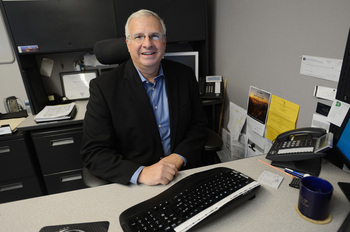
A collector speaks to a debtor on the phone on the "collection floor" at the Ann Arbor Credit Bureau.
Melanie Maxwell | AnnArbor.com
“Everyone’s thinking about the family getting together, the exchanging of gifts, and they start to think about the disposable money that might otherwise be used to pay down bills,” Ann Arbor Credit Bureau vice president Thomas Oldani said.
“There’s just more competition for every dollar, and when consumers think about the priorities for those dollars, fulfilling their outstanding obligation falls pretty low on that list.”
Bill collection is a very difficult industry in the best of times. While common perception is that debt collectors are successful 50 percent of the time or more, collectors say it’s not so easy.
According to the Association of Credit and Collection Professionals, debt turned over to third party collection agencies was only collected at a rate of 17 cents on the dollar until the economic recession began in 2008. Major contributors to the low rate included bankruptcies, death of debtors, and simple inability to pay.
Since the recession began, the collection rate has dipped to under 10 cents for every dollar of debt passed onto the agencies.

Ann Arbor Credit Bureau vice president Thomas Oldani said he tries to focus his collectors on their mission of helping people with debt resolve their obligations.
Melanie Maxwell | AnnArbor.com
“When the payments start to dry up that’s because there’s either an inability or an unwillingness to pay because there isn’t work available.”
Maslow theorized in his hierarchy of needs that humans prioritize their efforts first based on survival, then safety, then belonging, then esteem.
Similarly, Oldani said that consumers go through prioritization when they decide what they will pay as they look at their various bills and obligations.
“Things that are urgent — the roof over their head, the mortgage or rent, food, the car they take to work, the telephone bill, nowadays the mobile phone and internet — those are all going to be paid first,” he said. “And then other bills fall down to the bottom.”
Both Barden and Oldani said that the goal of debt collectors is not to be a burden on consumers, but to help them manage their obligations in a way that allows them to raise their credit score and be free of obligations.
“Communication is the best thing for us, keeping that link open between us and the consumer,” Oldani said.
“It’s a cooperative endeavor. We don’t want to collect disputed debt or debt caused by fraud. With the cooperation of the consumer we can work together to an agreeable solution.”
As the economy improves, Oldani said that the bureau starts to field more calls of consumers who want to repay old debts.
“What typically happens is that it was not at the front of their mind, but now that they have a job they’re looking at replacing their old car, or looking at getting a home,” he said.
“And that requires a financial review of their credit file. Then these debts show up and they realize they have to take care of their old payments before they can take on new ones.”
There’s no typical “January bump” of people following through on New Year's resolutions to put their financial houses in order, Oldani said, but he thinks it would be a great idea for people to consider as they do their last minute shopping.
“The key is planning,” he said.
“Make a budget and stick to it. Recognize that you can get yourself into real tough troubles when what you’re trying to do is get in the spirit of the season.”
Barden agreed that making a budget was key, and he went even further in his advice to consumers.
“If you don’t have the money, don’t spend it,” he said.
“Don’t buy on credit because it will snowball on you. It happens to everybody. Sooner or later the collector will come to call.”
Ben Freed covers business for AnnArbor.com. You can sign up here to receive Business Review updates every week. Reach out to Ben at 734-623-2528 or email him at benfreed@annarbor.com. Follow him on twitter @BFreedinA2